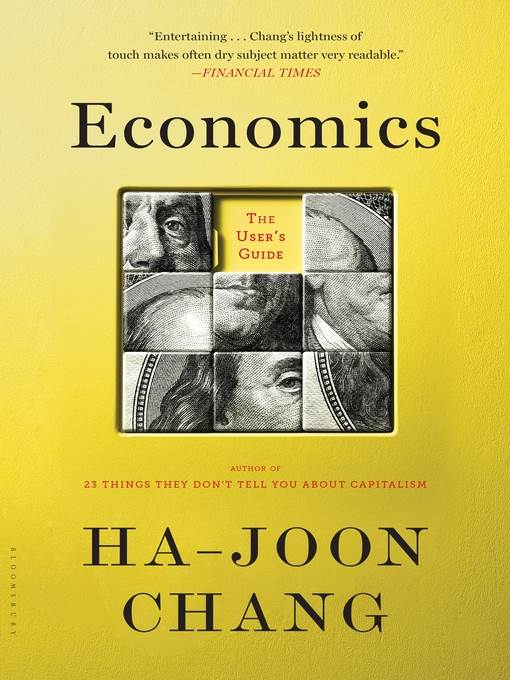
Economics
The User's Guide
کتاب های مرتبط
- اطلاعات
- نقد و بررسی
- دیدگاه کاربران
نقد و بررسی

June 30, 2014
Cambridge economist Chang (23 Things They Don’t Tell You about Capitalism) wants to popularize his field through accessible writing and explanations of our material world. The result is a synthesis—half textbook, half browser—that the author suggests should be read in snippets. Chang notes depressingly that economic history has, for economists, turned into a “harmless distraction, like trainspotting, and at worst as a refuge for the intellectually challenged who cannot handle ‘hard’ stuff like mathematics and statistics.” The book’s first section tries to reconcile and differentiate lines of thought, examining capitalism as a system through classical, Marxist, Keynesian, Schumpeterian, and other perspectives. In the bracing chapter, “Dramatis Personae,” Chang presents a sharp-edged summary of individuals and organizations that comprise the world economy. Despite these highlights, too much of the book dutifully checks off significant-topics-in-economics boxes. Chang stresses the seriousness of global poverty and environmental constraints, for example, but in clichéd language. The book’s whole is less than its parts, partly because the large print and minimal graphics make its many moving parts hard to grasp. Still, it works as an accessible introduction to the field. What Change shows is that economics in its many guises is vitally important to our everyday lives, and as such remains fascinating, the opposite of Carlyle’s so-called dismal science.

July 1, 2014
The dismal science rendered undismally, even spryly, by economist Chang (Economics/Cambridge Univ.; 23 Things They Don't Tell You About Capitalism, 2011, etc.).A certain online bookseller, news reports will tell you, is behaving monopolistically. That's not strictly accurate: There are other places to buy books, but few are as powerful in the marketplace, so much so that publishers walk in fear of it. That makes the bookseller something between an oligopsony and a monopsony. Writes Chang, "Oligopolistic firms cannot manipulate their markets as much as a monopolistic firm can, but they may deliberately collude to maximize their profits by not undercutting each other's prices-this is known as a cartel." Conversely, he notes, oligopsonistic and monopsonistic firms were "considered to be theoretical curiosities even a few decades ago," but they're very real today-and more important than monopolies in shaping economies. In other words, it's not your grandfather's economic scene out there, far less Karl Marx's. That makes Chang's note on historical schools particularly important: He observes that most economic schools, from the right-leaning Austrians to the centrist Keynesians to the leftist Marxists, "all share a class-based vision of society." He helpfully adds that no one school holds a monopoly on the truth, though the free-market school has increasingly been proved out of touch thanks to the development of the idea of asymmetric information-in a situation when buyer knows something that seller doesn't and vice versa, no market can be truly free. This leads Chang into the currently hot area of inequality, on which he takes a measured stance that won't displease followers of Thomas Piketty's recent critique of predatory capitalism. In the end, Chang urges readers to become "active economic citizen[s]," which, he adds, isn't as hard as it might seem.Economics for the 99 percent who don't know moral hazard from opportunity cost: lively, intelligent and readily accessible.
COPYRIGHT(2014) Kirkus Reviews, ALL RIGHTS RESERVED.

September 1, 2014
Chang (economics, Cambridge Univ.; 23 Things They Don't Tell You About Capitalism) presents a real-world view of economics in his latest work. It's lengthy, but a section titled "How To Read This Book" offers suggestions for those who don't want to read straight through. After a long discussion of the history of economics and explanations of all of the schools of thought, the author shows economics at work using current events as his guide and covering topics from unemployment and poverty to finance and production. While billed as a primer on economics, this is not an introductory textbook. Instead, it is a practical guide that shows the importance of the subject as a worldview and how it fits into everyday life. And though readers won't find a pop quiz at the end of the work, Chang does highlight the important terms and ideas that they should walk away with. VERDICT A solid choice for those who want to learn more about economics without feeling like they are back in the classroom.--Elizabeth Nelson, McHenry Cty. Coll. Lib., Crystal Lake, IL
Copyright 2014 Library Journal, LLC Used with permission.

























دیدگاه کاربران